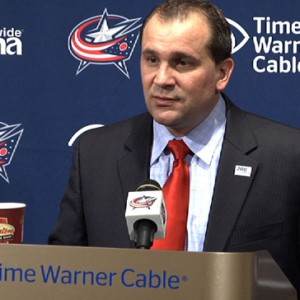The Tampa Bay Lightning dropped their second game of the season in a 3-1 loss to the Montreal Canadiens on Thursday. The Lightning are now 5-2-0 in 2016-17 and are third in the Atlantic Division with 10 points.

With the win, the Canadiens have now won six straight games and are 7-0-1 with 15 points — good for first place in the Atlantic Division. The Detroit Red Wings are now in second place with 12 points.
The Lightning may have lost the game, but the team’s performance through seven games reveals three keys to the team’s success that can carry the Lightning through the regular season and areas where they can improve.
‘The Stamkos Effect’ and Balanced Scoring
Steven Stamkos is playing some of the best hockey of his career through the first seven games of 2016-17 and his teammates are following his lead.
The 26-year-old captain leads the team with nine points and is second with five goals and is playing the sort of two-way game that the Lightning need him to play to be at their best. The team has had goals scored by 11 different players and 16 members of the roster have contributed a point or more. It’s the sort of productivity that reflects the team’s depth and has helped the team to a 3-0 start and five wins in their first seven games.

When Stamkos chose to re-sign with the Lightning this offseason, it sent an important message to his teammates that he wanted to finish what they have started — particularly in the last two seasons, as the team has been two wins from a Stanley Cup in 2015 and five wins from one in 2016.
Stamkos’ teammates followed his lead, as franchise cornerstones like Victor Hedman and Andrei Vasilevskiy signed contract extensions ahead of free agency and the team was able to re-sign Alex Killorn and Nikita Kucherov. One by one, general manager Steve Yzerman was able to keep virtually the same roster together for a third season.
The team is playing as a cohesive unit and their mentality relates directly back to Stamkos.
Goaltending Strength
The strength of the Lightning’s goaltenders allows the team to start a number one caliber netminder on any given night.

The need for goaltending depth has been shown across the league in the early part of 2016-17, as the Los Angeles Kings’ Jonathan Quick was lost for an extended period because of a groin injury and the Boston Bruins’ Tuukka Rask has missed games recently due to what is being called general soreness. The Kings and Bruins have both struggled to recover from the losses of their respective starters.
The Lightning’s ability to roll with Ben Bishop or Andrei Vasilevskiy has been an important part of the team’s success.
Bishop, 29, has started five games this season and posted a 3-2-0 record with a 3.22 goals against average and an .891 save percentage. While these figures aren’t Bishop-like in comparison to past seasons, he has made big saves for the Lightning in most games and has given them a chance to win most nights.
He bounced back from a poor start against the Colorado Avalanche — a 4-0 loss — to backstop the Lightning to back-to-back wins on the road before dropping Thursday’s contest to the Canadiens. Despite the loss, Bishop stopped 23 of the Habs’ 25 shots and finished the game with a .920 save percentage.

Vasilevskiy has gotten the call between the pipes for the Lightning in two games this season and has gone 2-0-0 with a 1.51 goals against average and a .951 save percentage. Head coach Jon Cooper has said he wants to ensure the 22-year-old netminder receives at least one start per week — a move that stands to benefit the Lightning in two ways.
First, it allows Vasilevskiy, who is presumably the Lightning’s goaltender of the future, to gain valuable regular season experience he lacked heading into 2016-17. Vasilevskiy had seen action in just 40 games outside of the postseason, but starting at least one game per week stands to give him 25 to 30 starts over the course of a season that is almost 26 weeks long.
Second, it provides Bishop the opportunity to remain fresh throughout the course of an 82-game season and into a playoff run. Bishop has started a combined 120 games and seen action in three more the past two regular seasons and played 36 postseason games in that same time period. Bishop has battled injuries in each of the team’s postseason berths and Cooper and Co. want to avoid that at all costs.
With Bishop’s pending unrestricted free agency and NHL expansion, this is almost certainly the team’s last season with both goaltenders. The Lightning are taking advantage of the situation by rolling both goaltenders, and both players’ performances early on allow the team to take chances offensively.
Power Play Efficiency
The Lightning’s productivity on the power play has been a sharp contrast from last season and been a game changer for the club in the early going of 2016-17.

The power play was an Achilles’ heel for the club through the regular season and into the playoffs in 2015-16. The Lightning were 28th during the regular season and followed with a ninth place performance in the postseason.
The Lightning added assistant coach Todd Richards to the coaching staff this offseason. Richards has had success as a head coach with the Columbus Blue Jackets and Minnesota Wild and began his NHL coaching career as an assistant with the San Jose Sharks in 2008-09.
Richards has been assisting with facilitating the power play — a focus for the team early on and one that has paid dividends for the club to start the season. The Lightning entered Thursday’s game third in the league with a 30.4% success rate.

The Lightning were unable to capitalize on three power plays against the Canadiens and fell to fourth in the league at 26.9%, but the progress the team has made on the man advantage cannot be ignored.
The Lightning are rolling two strong power play units and are utilizing Jonathan Drouin as a quarterback on the team’s second unit. Drouin has scored three of his five points on the power play and looks comfortable in his special team’s role.
The Lightning were able to overcome the team’s struggles on the power play to earn a trip to the 2016 Eastern Conference Final, but they also had to play their way into a favorable playoff slot late in the regular season, in part, due to that continuing issue.
Looking Ahead
The team now turns its focus to the second half of a six-game road trip, playing the New Jersey Devils on Saturday, followed by games against the New York Rangers and New York Islanders before returning home on Nov. 3.

The Lightning beat the Devils 3-2 in the second game of the season, but will be facing the Rangers and Islanders for the first time in 2016-17.
While the Lightning have won five of seven games to open the season, there are areas of improvement for the club moving forward — some of which were seen during Thursday’s game against the Canadiens.
The Lightning were unable to manage their first shot until more than 12 minutes into the first period and had just four shots at the end of 20 minutes. They bounced back with 27 shots in the final two periods to finish the game with 31 shots to the Canadiens’ 26. That said, generating shots and doing it early can translate to offensive production.
Complete Lightning Coverage From THW
The Lightning have scored in the first period just once all season when they tallied three goals against the Maple Leafs on Oct. 26. While the team has been able to dig themselves out of holes to win games early on, scoring the first goal of a game and doing it early is certainly a focus.
If the Lightning are able to win the next three games, they will return home with eight wins and four of their next five games at Amalie Arena — a great position to be in just 10 games into the season. By continuing to improve and receiving balanced scoring, strong goaltending and being efficient on the power play, that possibility can become a reality.